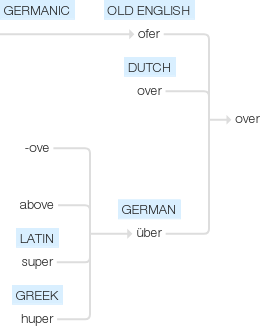Over
Old English ofer, of Germanic origin; related to Dutch over and German über, from an Indo-European word (originally a comparative of the element represented by -ove in above ) which is also the base of Latin super and Greek huper .
wiktionary
From Middle English over, from Old English ofer, from Proto-Germanic *uber(“over”), from Proto-Indo-European *upér, a comparative form of *upo; akin to Dutch over, German ober, über, Danish over, Norwegian over, Swedish över, Icelandic yfir, Faroese yvir, Gothic 𐌿𐍆𐌰𐍂( ufar), Latin super, Ancient Greek ὑπέρ(hupér), Albanian upri(“group of peasants”), Sanskrit उपरि(upári).
From Middle English over(“riverbank, seashore, brink”), from Old English ōfer(“riverbank, seashore, brink, edge, margin, border”), from Proto-Germanic *ōferaz. Cognate with Dutch oever(“riverbank, shore”), German Ufer(“shore, shoreline, riverbank”), Low German Över(“shore, riverbank”).
etymonline
over (prep., adv.)
Old English ofer "beyond; above, in place or position higher than; upon; in; across, past; more than; on high," from Proto-Germanic *uberi (source also of Old Saxon obar, Old Frisian over, Old Norse yfir, Old High German ubar, German über, Gothic ufar "over, above"), from PIE root *uper "over."
As an adjective from Old English uffera. The senses of "past, done, finished; through the whole extent, from beginning to end" are attested from late 14c. The sense of "so as to cover the whole surface" is from c. 1400. Meaning "leaning forward and down" is from 1540s. The meaning "recovered from" is from 1929. In radio communication, it is used to indicate the speaker has finished speaking (1926).
Above expresses greater elevation, but not necessarily in or near a perpendicular direction; over expresses perpendicularity or something near it: thus, one cloud may be above another, without being over it. Over often implies motion or extension where above would not; hence the difference in sense of the flying of a bird over or above a house, the hanging of a branch over or above a wall. In such uses over seems to represent greater nearness. [Century Dictionary]
Phrase over and above (mid-15c.) is pleonastic, for emphasis. Adjective phrase over-the-counter is attested from 1875, originally of stocks and shares. To be (someone) all over "be exactly what one expects of (someone)" is by 1721.
